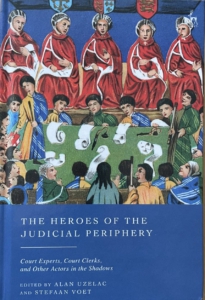Views
Colonialism and German PIL (4) – Exploiting Asymmetries Between Global North and South
This post is part of a series regarding Colonialism and the general structure of (German) Private International Law, based on a presentation I gave in spring 2023. See the introduction here.
As mentioned in the introduction, this series does not intent to automatically pass judgment on a norm or method influenced by colonialism as inherently negative. Instead, the aim is to reveal these influences and to initiate a first engagement with and awareness of this topic and to stimulate a discussion and reflection.
The first post (after the introduction) dealt with classic PIL and colonialism. This second considered structures and values inherent in German or European law, implicitly resonating within the PIL and, thus, expanding those values to people and cases from other parts of the world. The third category discusses an imagined hierarchy between the Global North and Global South that is sometimes inherent in private international law thinking. The fourth and for the moment last (but not least) category deals with PIL rules that allow or at least contribute to the exploitation of a power asymmetry between parties from the Global North and the Global South. For example, this power and negotiation asymmetry, in conjunction with generous rules on party autonomy, can lead to arbitration and choice of law clauses being (ab)used to effectively undermine rights of land use under traditional tribal law.
After the first post, in the comment section a discussion evolved regarding the (non-)application of tribal law. One question asked for an example. This post can also (hopefully) serve as such an example.
Colonialism and German PIL (3) – Imagined Hierachies
This post is part of a series regarding Colonialism and the general structure of (German) Private International Law, based on a presentation I gave in spring 2023. See the introduction here.
As mentioned in the introduction, this series does not intent to automatically pass judgment on a norm or method influenced by colonialism as inherently negative. Instead, the aim is to reveal these influences and to initiate a first engagement with and awareness of this topic and to stimulate a discussion and reflection.
The first post (after the introduction) dealt with classic PIL and colonialism and already sparked a vivid discussion in the comments section. This second considered structures and values inherent in German or European law, implicitly resonating within the PIL and, thus, expanding those values to people and cases from other parts of the world. The third category discusses an imagined hierarchy between the Global North and Global South that is sometimes inherent in private international law thinking, for instances where courts or legislators abstractly or paternalistically apply the public policy to “protect” individuals from foreign legal norms. This is especially evident in areas like underage marriages and unilateral divorce practices found inter alia in Islamic law.
US Ninth Circuit rules in favor of Spain in a decades-long case concerning a painting looted by the Nazis
This interesting case comment has been kindly provided to the blog by Nicolás Zambrana-Tévar, LLM, PhD, KIMEP University
The United States Court of Appeals for the Ninth Circuit has found in favor of Spain as defendant in a property case spanning several decades. A panel of three judges has unanimously ruled that, applying California conflict of law rules, Spain has a stronger interest than the claimants in the application of its own domestic law, including its own rules on prescriptive acquisition of property and the statute of limitations, thus confirming the ownership of a stolen painting, now owned by a Spanish museum.
News
Conference: “The Next 25 Years of Private International Law: What Does the World Need?”, 23 June 2025 in Groningen
The Ulrik Huber Institute for Private International Law is delighted to announce a special one-day conference entitled:
The Next 25 Years of Private International Law: What Does the World Need?
This conference marks a significant occasion: the celebration of Professor Mathijs ten Wolde’s 25-year tenure as a professor and director of the Ulrik Huber Institute. In honour of his contribution to the field and his mentorship of generations of legal scholars, the event will bring together former PhD students and distinguished colleagues from across the globe to reflect on the future direction of private international law.
Key Themes Include:
- The role of private international law in a changing world;
- Evolving cross-border legal frameworks (e.g. EU Regulations and HccH Conventions);
- Regional vs. global harmonisation efforts;
- The impact of digitalisation;
- New frontiers in family, commercial, IP, transport and procedural law.
We warmly invite all scholars, practitioners and students with an interest in private international law to join us for this day of dialogue and celebration. More information, including the conference programme, is available via the following link: https://www.rug.nl/rechten/agenda/2025/the-next-25-years
New Book and Seminar Heroes of the Judicial Periphery
 Last month the book The Heroes of the Judicial Periphery: Court Experts, Court Clerks, and Other Actors in the Shadows, edited by Alan Uzelac and Stefaan Voet (Hart/Bloomsbury Publising, 2025) was published. The book highlights the role of perhaps less prominent, but nevertheless important actors in (international) judicial procedures from a national, comparative and/or international perspective.
Last month the book The Heroes of the Judicial Periphery: Court Experts, Court Clerks, and Other Actors in the Shadows, edited by Alan Uzelac and Stefaan Voet (Hart/Bloomsbury Publising, 2025) was published. The book highlights the role of perhaps less prominent, but nevertheless important actors in (international) judicial procedures from a national, comparative and/or international perspective.
The European Civil Justice Centre (Erasmus School of Law) hosts a seminar in collaboration with the editors to launch the book on 4th July 2025 from 10-12 CEST.
Discussions on civil justice mostly focus on procedural rules, and the role of courts, parties and lawyers. This book addresses other actors that are often overlooked in academic and policy debates. It assesses the role of court experts, court clerks and court staff, and other actors on the ‘judicial periphery’ who play an important role and often co-determine the pace, outcome, and tone of the judicial process.
The knowledge and skills of experts may be indispensable at times, but it is among the most expensive, complicated and time-consuming means of evidence. The judges adjudicate, but where experts are involved in the process, they have a decisive impact on the outcome of litigation. Therefore, a principal focus of the book is on experts and how they are appointed, managed, and remunerated across Europe and the world.
The editors will discuss topical issues highlighting these ‘actors in the shadows’ and key experts will present their ideas based on the key findings of the book chapters, followed by discussion.
Registration for free here (hosted through Eventbrite)
Speakers & program:
10.00 Opening and welcome: Xandra Kramer
10.05 Alan Uzelac & Stefaan Voet – Heroes of the Judicial Periphery
10.15 Juraj Brozovic – The Case of Judicial Advisors in Croatia
10.30 Camilla Bernt – Expert Evidence in Custody Disputes and Child Protection Cases
10.50 Discussion
11.05 Michael Stürner – Experts on Foreign Law in German Civil Procedure
11.30 Adriani Dori & Xandra Kramer – The Role of Third-Party Funders in the Shadow of the Procedure
11.45 Discussion
Book on The New Relationship between the United Kingdom and the European Union
A book on The New Relationship between the United Kingdom and the European Union was recently published. The book is edited by Dr. Emmanuel Guinchard (Liverpool John Moores University) and Prof. Carlo Panara (University of Leicester) and may be accessed here.
Overview
- Covers the whole spectrum of the new relationship between the UK and the EU
- Contains original discussion and evaluations of the impact of Brexit on UK sovereignty
- Includes both topics covered in the recent agreements and topics that have been left in a grey area



